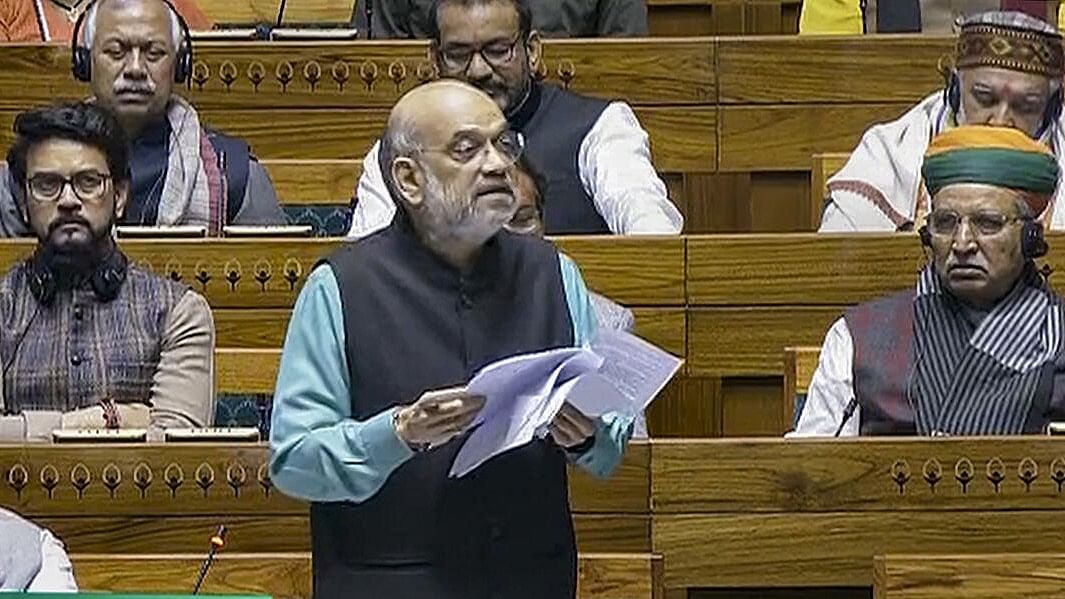
Home Minister Amit Shah
Credit: PTI Photo
New Delhi: Home Minister Amit Shah asserted on Saturday that Prime Minister Narendra Modi took all sections of society along on the Ram temple issue and described the Supreme Court verdict on the matter as a reflection of India's secular character to the world.
Speaking in the Lok Sabha during a discussion on the construction of the Ram temple in Ayodhya and the consecration ceremony on January 22, he said that in no other country has the majority community waited for so long for a matter related to its faith.
The home minister said Ram is not a person but a symbol of an ideal life for crores of Indians and that is why he is known as "Maryada Purushottam".
"The concept of Ram Rajya is not for any particular religion or sect. Ram Rajya symbolises an ideal state not only for India but the entire world," he said.
People who imagine India without Ram do not know the country and symbolise the era of slavery, he said, noting that the illustrations of the God and the "Ram Darbar" were given space in the Constitution too
January 22 is going to be historic for thousands of years, Shah said.
Shah underlined that there were apprehensions that post the Supreme Court verdict there could be unrest but such fears were unfounded as the country saw a harmonious atmosphere.
In a unanimous verdict in 2019 in the Ram Janmabhoomi-Babri Masjid title case, the Supreme Court paved the way for the construction of the temple and directed the Centre to allot an alternative five-acre plot to the Sunni Waqf Board for building a new mosque at a "prominent" place in Ayodhya.
The Supreme Court verdict on the Ram temple showed India's secular character to the world, Shah said.
He also lauded all those who participated in the long struggle on various fronts on the Ram temple issue.
People's struggle for constructing the Ram temple in Ayodhya began in 1528 and the legal battle fought for it started in 1858, he said, adding that it all came to an end on January 22 which rejuvenated India's faith and marked the beginning of the journey of a great India.
He recalled that the BJP had passed a resolution in its Palampur executive meeting in 1989 saying that the construction of the Ram temple should not be linked with a religion.
The BJP had thrown its weight behind the construction of the Ram temple with the adoption of what has come to be known as the Palampur resolution, and its senior leader LK Advani launched his Rath Yatra a year later.
This was a movement for the revival of the consciousness of the country. That is why we will legally liberate the Ram Janmabhoomi and build a Ram temple at that place, he said in the House.
The temple's construction is the journey from struggle to devotion, from chanting 'Jai Shri Ram' to 'Jai Sia Ram', he said while heaping praise on Modi for his leadership and the arduous religious discipline he subjected himself for 11 days in the run-up to the January 22 ceremony.
In an apparent swipe at some opposition members, he said those who imagine India without Lord Ram do not know India.
Critics used to mock the BJP over its promises alleging they were driven by electoral exigencies, he said, asserting that the Modi government banned triple talaq as well and fulfilled many other commitments.
The BJP and its leader Modi do what they say, he said.
India's culture cannot be separated from Ramayana, Shah said and added that an over 300 years long struggle ended with the inauguration of the Ram mandir.
"The date of January 22 marks the beginning of the journey of great India. This day paves the way for Maa Bharti (mother India) to take us on the path of becoming Vishwaguru (world leader). It was a day that marked the hopes, aspirations and accomplishments of crores of devotees," Shah said, adding that the Ram mandir is a sign of cultural rejuvenation.
Shah said the journey that started on January 22 will be carried forward and expressed confidence that the Modi government will come back to power in 2024 after the general elections.
The Ram mandir has been built following legal and constitutional mandate, Shah said, adding that the BJP kept its patience and the Ram temple was built in Ayodhya in a "harmonious environment".
No political slogans were raised at the consecration ceremony, Shah said, adding, "I say with folded hands that accept the message of unity and move forward."
Addressing critics, he said they should accept the overwhelming popular sentiment on the issue and not vitiate the atmosphere of joy and devotion.
Remembering BJP veteran Advani's contribution with his 'Rath Yatra', he said it acted as an awakening for people and Modi during his tenure finally fulfilled their aspirations.